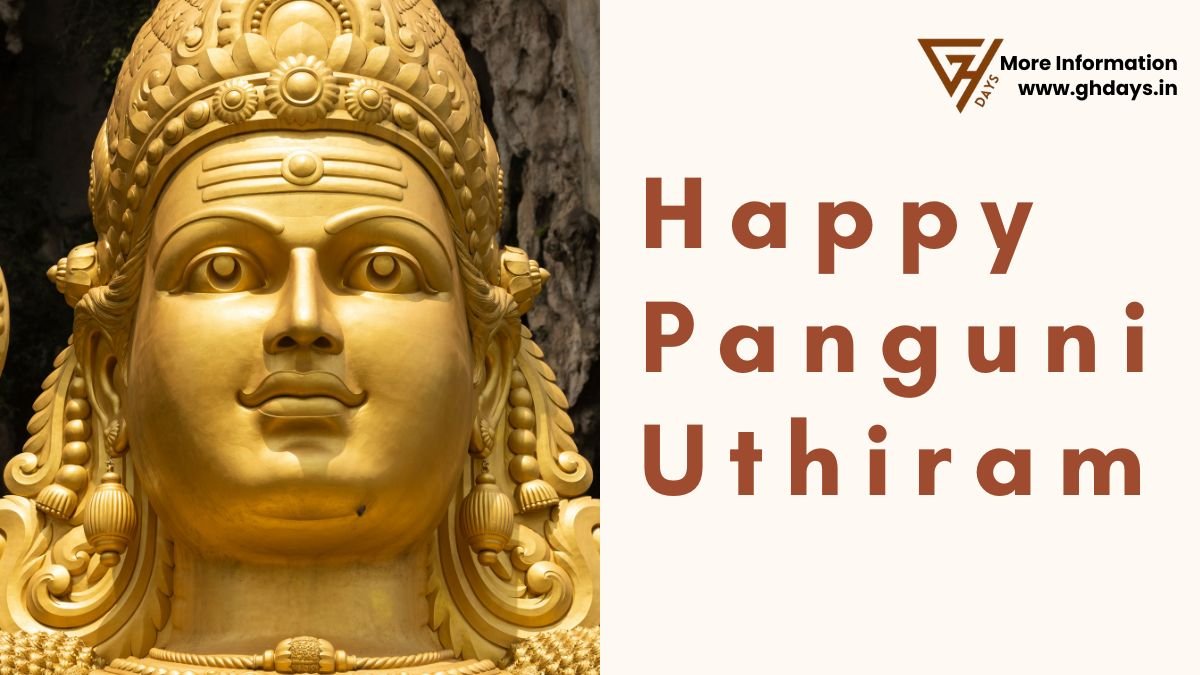Panguni Uthiram Date 2025: Puja Vidhi and Importance – GHdays
The celebration of Panguni Uthiram, a significant Tamil Hindu festival, commences on the auspicious occasion of the full moon in the Panguni month, spanning from 14 March to 13 April. This festival aligns with the transit of the moon through the Uttiram nakshatram (Uttara Phalguni asterism) during the twelfth month of Panguni in the Tamil calendar, corresponding with the Hindu months of Phalguna/Chaitra. Notably, Panguni signifies the culmination of the Solar Tamil Calendar year, heralding the onset of the approaching New Tamil Year.
Panguni Uthiram Date 2025: April 11, Friday
Table of Contents
Panguni Uthiram 2025 Overview
| Festival Name | Panguni Uthiram |
| Observed by | Tamil People |
| Type | Hindu |
| Significance | Commemoration of the weddings of Shiva and Parvati, Rama and Sita, Murugan and Devasena, Ranganatha and Andal, Manifestation of Ayyappan |
| Celebrations | Kavadi |
| Observances | Puja in Vaishnava and Shaiva temples, Festival of the 63 Saints (Nayanars) |
| Panguni Uthiram Date | Full moon day of the month of Panguni |
Panguni Uthiram Puja Timings 2025
On the auspicious day of Panguni Uthiram in the year 2025, devotees will have the opportunity to partake in the sacred Panguni Uthiram Shubh Muhurtham. This year, Panguni Uthiram falls on Friday, the 11th of April 2025. The Uthiram Nakshathram, an important astrological occurrence, is set to begin at 12:24 on the 10th of April 2025 and will conclude at 15:10 on the 11th of April 2025. This celestial alignment holds significant spiritual and cultural importance for those observing this sacred day.
| Panguni Uthiram Date 2025 | Friday, April 11 |
| Panguni Uthiram Date 2026 | Wednesday, April 1 |
| Panguni Uthiram Date 2027 | Monday, March 22 |
| Panguni Uthiram Date 2028 | Saturday, April 8 |
| Panguni Uthiram Date 2029 | Thursday, March 29 |
| Panguni Uthiram Date 2030 | Tuesday, March 19 |
Celebration of Panguni Uthiram
Followers of Murugan carry a kavadi to fulfill their vows, which is a common practice in Murugan temples. The Brahmanda Purana mentions that during Panguni Uthiram, countless deities purify themselves in the Tumburu Tirtha, one of the seven sacred tanks at the Venkateshvara Temple in Tirupati.
It is believed that bathing in the temple tank on this day can liberate individuals from the cycle of rebirth. This day holds special importance for honoring the prithvi lingam, representing the earth element, at the Ekambareswarar Temple in Kanchipuram, Tamil Nadu, where celebrations extend over a period of 13 days. As per local beliefs, Parvati, embodied as Gauri, wedded Shiva in Kanchipuram, giving rise to the celebration known as Gauri Kalyanam.
Significance of Panguni Uthiram
- The Panguni Uthiram festival celebrates the sacred unions of divine couples like Shiva and Parvati, Rama and Sita, Murugan (Kartikeya) and Devasena, and Ranganatha (Vishnu) and Andal. It is also a time to honor the presence of Ayyappan.
- Legend has it that Lakshmi emerged from the Ocean of Milk during the Samudra Manthana event, which is commemorated as Mahalakshmi Jayanti.
- This day serves to highlight the sanctity and importance of married life, emphasizing the virtues of household duty.
Rituals During Panguni Uthiram
During Panguni Uthiram, adherents rise early, bathe, and don fresh attire prior to venerating Lord Shiva. The deity’s image is crafted from either metal or gold, as per preference. Subsequently, devotees adorn the idols with exquisite blooms and ornaments, proceeding to worship them through the offering of sacred puja paraphernalia.
Following this, the nuptial rites between Lord Shiva and Devi Parvati are solemnized. A special banquet is prepared, extending invitations to the devotees and followers of Lord Shiva. Thereafter, Prasad is distributed among the attendees. A stringent fast is upheld on this day, allowing devotees to partake in only one meal, supplemented by Prasad in the form of Payasam and fruits. The subsequent day sees participants of the Kalyani Vrata bestowing the idols of Lord Shiva and Goddess Parvati upon another devout follower of Lord Shiva, in adherence to the customary practice.
